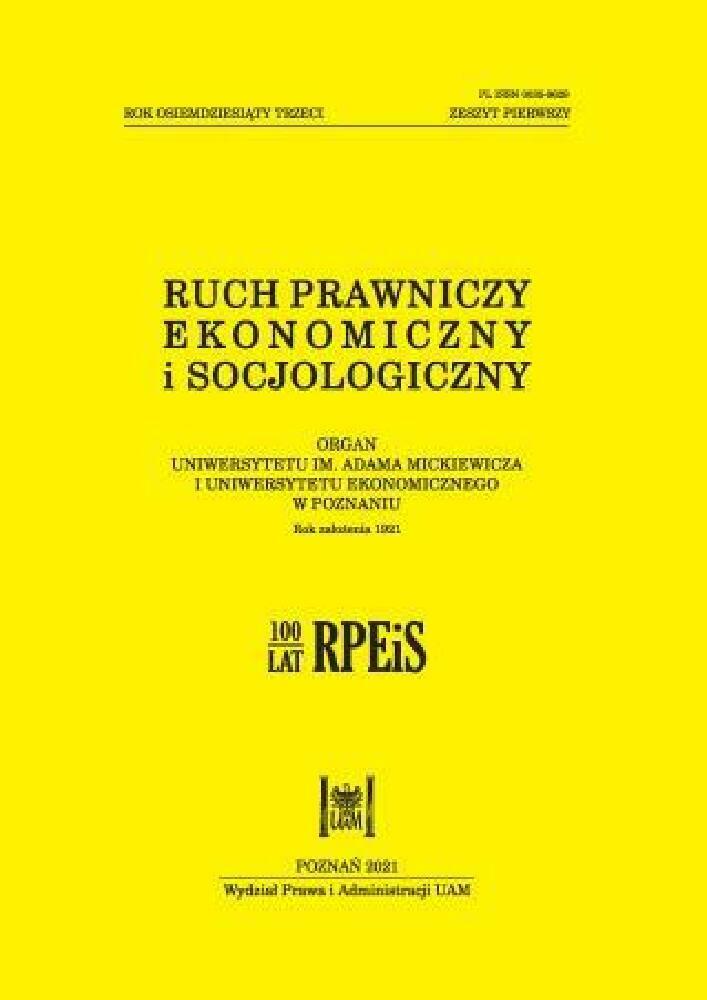Abstrakt
Coraz częstsze stosowanie domniemań w postępowaniach z zakresu prawa konkurencji Unii Europejskiej przyczyniło się w ostatnich latach do przesunięcia w znacznej mierze ciężaru dowodu z organu ochrony konkurencji na przedsiębiorstwo. Stosowanie domniemań w prawie konkurencji jest szczególnie złożone w przypadku spraw dotyczących nadużywania pozycji dominującej zakazanej na podstawie art. 102 Traktatu o funkcjonowaniu Unii Europejskiej. Niniejszy artykuł wskazuje problemy związane ze wzruszeniem domniemania naruszenia reguł konkurencji przez dominujące przedsiębiorstwo. Wyrok Trybunału Sprawiedliwości w sprawie Intel stanowi ciekawe tło dla rozważań w tym kontekście. W artykule zaproponowano także sposoby wzruszenia domniemania naruszenia reguł konkurencji przez dominujące przedsiębiorstwo.
Bibliografia
Bailey, D. (2010). Presumptions in EU Competition Law. European Competition Law Review 31(9): 21–27.
Bułakowski, K. (2017). Rabaty stosowane przez przedsiębiorstwa dominujące w świetle orzecznictwa TSUE w latach 2011–2015. Internetowy Kwartalnik Antymonopolowy i Regulacyjny 5(6): 28–45.
Castillo de la Torre, F. (2009). Evidence, proof and judicial review in cartel cases. World Competition 32(4): 505–578.
Da Cruz Vilaça, J.L. (2018). The intensity of judicial review in complex economic matters – recent competition law judgments of the Court of Justice of the EU. Journal of Antitrust Enforcement 6(2): 173–188.
Fernández, C. (2019). Presumptions and burden of proof in EU competition law: the Intel judgement. Journal of European Competition Law and Practice 10(7): 448–456.
Geradin, D. (2015). Loyalty rebates after Intel: time for the European Court of Justice to overrule Hoffman-La Roche. Journal of Competition Law and Economics 11(3): 579–615.
Ibáñez Colomo, P. (2014). Intel and article 102 TFEU case law: making sense of a perpetual controversy. LSE Legal Studies Working Paper No. 29: 2–14.
Ibáñez Colomo, P. (2018). The future of article 102 TFEU after Intel. Journal of European Competition Law and Practice 9(5): 293–303.
Kadar, M. (2019). Article 102 and exclusivity rebates in a post-Intel world: lessons from the Qualcomm and Google Android cases. Journal of European Competition Law and Practice 10(7): 439–447.
Kalintiri, A. (2015). The allocation of the legal burden of proof in article 101 TFEU cases: a “clear” rule with not-so-clear Implications. Yearbook of European Law 34: 232–256.
Nihoul, P. (2014). The ruling of the General Court in Intel: towards the end of an effect-based approach in European competition law? Journal of Competition Law and Practice 5(8): 521–530.
Ritter, C. (2018). Presumptions in EU Competition Law. Journal of Antitrust Enforcement 6(2): 189–212.
Wils, W. (2014). The judgment of the EU General Court in Intel and the so-called more economic approach to abuse of dominance. World Competition 37(4): 405–434.
Licencja
Prawa autorskie (c) 2021 WPiA UAM

Utwór dostępny jest na licencji Creative Commons Uznanie autorstwa – Użycie niekomercyjne – Bez utworów zależnych 4.0 Międzynarodowe.





